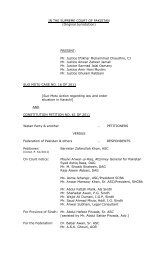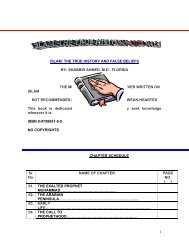The Encyclopedia Of Demons And Demonology
The Encyclopedia Of Demons And Demonology
The Encyclopedia Of Demons And Demonology
You also want an ePaper? Increase the reach of your titles
YUMPU automatically turns print PDFs into web optimized ePapers that Google loves.
possession 201<br />
Dangers of Demonic Possession<br />
Severely possessed people are in danger of dying (see<br />
MICHEL, ANNELIESE). According to the church, if they<br />
die before their demons are expelled, they are not necessarily<br />
condemned to hell. If they die in a state of grace,<br />
they will go to heaven. Once a victim is dead, the demons<br />
depart.<br />
Those present at an exorcism—the exorcists, assistants,<br />
and witnesses—are in danger of suffering possession<br />
from departing demons, who may seize an opportunity<br />
to occupy a new host. At the very least, the demon,<br />
speaking through the victim, may hurl their secret fears<br />
and vices in their faces. Exorcists and demonologists also<br />
can suffer mishaps, such as strange accidents, while they<br />
are working on cases. Good health and a virtuous life are<br />
important defenses in dealing with possession cases.<br />
Nonetheless, some untrained paranormal investigators,<br />
attracted by the danger, have involved themselves<br />
in the field, thus opening themselves and their families<br />
to unpleasant problems. Exorcists stress that amateurs<br />
should not meddle in possession.<br />
Possession of Animals<br />
In the Catholic tradition, animals have the potential to<br />
become possessed, but reported cases are not common.<br />
<strong>The</strong> best biblical example is that of Jesus driving demons<br />
out of a man and into a herd of swine, which then commit<br />
suicide by drowning themselves in the sea (Mark 5:1–13).<br />
Animals that become possessed by demons act strangely<br />
and may exhibit self-destructive behavior, such as running<br />
in front of vehicles. If a possessed animal dies or is<br />
sacrificed, the demon departs.<br />
Possession by Djinn<br />
According to Islam, there are two principal causes of possession<br />
by DJINN, and both are forbidden by Allah. <strong>The</strong><br />
djinn can possess a person out of lewdness, desire, love,<br />
capriciousness, trickster horseplay, and whim. It will<br />
attack the weak, vulnerable, and insane; “under Satan’s<br />
touch” describes madness. Sometimes possession of this<br />
sort is permitted by the victim, but it is still forbidden.<br />
Without permission, the possession becomes a grave offense<br />
of oppression, and the djinn must be rebuked and<br />
informed that it has broken the laws of Allah.<br />
In the second case, djinn may possess a person out of<br />
revenge, if they feel they have been wronged or injured.<br />
Humans may inadvertently urinate on them, pour water<br />
on them, or kill them, causing the djinn to react by punishing<br />
the humans. In that case, the djinn should be informed<br />
that the harm was accidental, and the djinn are not permitted<br />
to occupy the person’s home, property, or body.<br />
In possession, djinn can make people speak in unintelligible<br />
languages, have supernormal strength, and run<br />
unnaturally fast. <strong>The</strong> djinn will rain blows upon people<br />
and make them have fits.<br />
Minor djinn called ZAR possess women and cause sickness,<br />
marital discord, and rebelliousness.<br />
Other Demonic Possession outside of Christianity<br />
Beliefs in the ability of negative, interfering spirits to<br />
possess people are universal. Views on possessing demons<br />
and their purposes vary, as do remedies against<br />
them. In Hinduism, possession permeates every facet of<br />
daily life. <strong>The</strong> victim is most often a woman, who attributes<br />
her personal problems—menstrual pain, barrenness,<br />
the death of children, miscarriage, abuse by<br />
husbands or fathers, the husband’s infidelities—to the<br />
intervention of evil spirits. Exorcism techniques include<br />
blowing cow-dung smoke, pressing rock salt between the<br />
fingers, burning pig excreta, beating the victim herself<br />
or pulling her hair, using copper coins as an offering,<br />
reciting prayers or mantras, and offering gifts of candy<br />
or other presents.<br />
In Japanese tradition, fox fairies cause similar negative<br />
conditions (see HULI JING; KITSUNE). <strong>The</strong> spirits communicate<br />
their requirements for departure, usually offerings<br />
of special foods.<br />
Elsewhere, negative spirits and even mischievous deities<br />
are held responsible for all bad things that happen.<br />
Sometimes, the possessed victims gain social status by<br />
becoming possessed, which entitles them to privileges,<br />
attention, and gifts.<br />
Possession by the Holy Ghost<br />
Voluntary possession by the divine presence is accepted<br />
in traditions of Christianity. <strong>The</strong> word enthusiastic originally<br />
meant being filled with the Holy Ghost or Holy<br />
Spirit, or the supreme state of oneness with God.<br />
After the Crucifixion and Resurrection of Jesus, on the<br />
first day of Pentecost (the date seven weeks after Passover,<br />
in the Jewish calendar), the apostles became possessed<br />
with the Holy Ghost. Acts describes how flames appeared<br />
above their heads and they spoke in tongues previously<br />
unknown to them. Speaking in unknown tongues, called<br />
glossolalia, and other ecstatic communion with God characterized<br />
early Christian worship but by the Middle Ages<br />
had come to signify the work of the Devil instead.<br />
In modern Christianity, the Pentecostal movement<br />
has revived interest in ecstatic religious practices. <strong>The</strong><br />
movement began on January 1, 1901, when a group of<br />
worshippers at Bethel College, Topeka, Kansas, reportedly<br />
received the Holy Spirit. Members of Pentecostal<br />
churches may speak in tongues, engage in long prayer revivals,<br />
perform faith healing, and even roll and writhe on<br />
the floor as the spirit fills them.<br />
Such voluntary and temporary possessions are a “religious<br />
altered state of consciousness.” <strong>The</strong>ir phenomena<br />
are similar to cases of demonic possession, in which the<br />
possessed person exhibits rigidity of limbs, speaking in<br />
foreign languages or tongues, dilation of pupils, visions,<br />
insomnia, fasting, self-infliction of pain, sensations of a<br />
burning death, and catatonia. <strong>The</strong>se states of consciousness<br />
can have 40-day cycles, imitating the 40-day withdrawal<br />
of Jesus into the desert.












